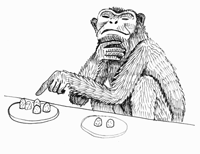STRANGE BUT TRUE- Food-centric: Why Sheba always picked the most

DRAWING BY DEBORAH DERR McCLINTOCK
Q. A chimpanzee named "Sheba" learned to recognize numbers one through eight. But did she know five gumdrops are better than two? –J. Goodall
A. Gumdrop lover, she would pick the bigger gumdrop array every time, says Dennis Coon in Introduction to Psychology. But then researchers tricked her: When she picked the larger array, now they would give these to a fellow chimp, leaving the smaller bunch for Sheba. "Sheba became visibly agitated at this foul turn of events," Coon says.
Again and again the testers did this, but Sheba never caught on to pick the smaller array. Yet when numbers were used instead of gumdrops, Sheba proved she knew the rule: Now she would select the smaller number to go to the other chimp, leaving more for herself.
The researchers reasoned that chimps living in the wild are genetically programmed to go for more food. Sheba couldn't rise above the allure of seemingly more gumdrops, even though picking the bigger bunch backfired. But freed to think abstractly— in numbers alone– she could do this.
And, says Coon, doesn't Sheba's behavior underscore the tremendous power we humans enjoy as a symbol-using species?
Q. ET aliens arrive through a space-time wormhole, saying they've come in peace but have only five minutes before the wormhole closes, and requesting a single gift to take back to their people. On hand you have a Bible, jar of peanut butter, computer, lip balm, copies of Physician's Desk Reference and Travel Guide to the Northeast, Van Gogh's original Starry Night, sheet music for Bach's Tocatta and Fugue in D-minor and a severed human finger. So, what do you give them? –C. Sagan
A. When Clifford Pickover polled scientists on this, reported in his book Alien IQ Test, the winner was Starry Night, because as one said, "It is visual and needs no translation." Also, it's the only real gift on the list.
Picking up on Hollywood's paranoia, many feared giving the aliens advanced technology or any sort of information such as the finger that could help them figure out our biology and conquer Earth. "You'd have to have a real death wish to give them one of these," said one respondent. Those who were most fearful picked the peanut butter or lip balm, though it was pointed out even peanuts and oils contain DNA, as do the bug parts in the jar and the fingerprints on the glass.
One even worried over giving the musical score— what might ink and paper analysis reveal?– but concluded it was worth the risk, revealing our sense of pattern and beauty. Another felt that "at least this would keep them busy doing cryptoanalysis in search of a message."
Q. Whatever happened to good old-fashioned romantic love? –S. O'Hara
A. Actually, old-fashioned love was based more on pragmatism, especially for women, say Carole Wade and Carol Tavris in Psychology. For many years, Western men were more romantic than women. A woman didn't just marry a man; she married a standard of living, so she couldn't afford to waste her time in a relationship that wasn't "going anywhere," even if she loved the guy.
As recently as the 1960s, while two-thirds of men said they wouldn't marry someone they didn't love, only a fourth of women ruled this out. But as women entered the workforce and two incomes became a necessity, this gap shrank and disappeared. "Nowadays, in every developed and developing nation, East and West, only tiny numbers of women and men would consider marrying someone who had all the 'right' qualities if they weren't in love with the person," the authors claim.
~
Send Strange questions to brothers Bill and Rich at [email protected].
#